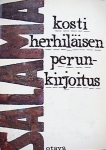(Korean language) Changes in pronunciation of Korean
"Standard language is wavering" (P'yojunmari hûndûllinda) in Chosun Ilbo. The younger the speaker the less "long pronunciation" (changûm) is used instead of short pronunciation (tanûm) [of vowels]; stressed (?) pronunciation (kyôngûm) also is more prominent with younger people. This comes out in a survey by the National Academy of the Korean Language(Kungnip kugô yôn'guwôn). 조사 결과 국어사전의 표준 발음과 실제 발음이 달라 표준어를 재사정할 필요성이 제기됐다. 가령 ‘관건’ ‘땅거미’ ‘보온병’ ‘불법’의 표준발음은 표제어와 동일하지만, 조사 대상자 다수는 ‘관껀’ ‘땅꺼미’ ‘보온뼝’ ‘불?’ 등으로 경음을 사용하고 있었다. 또 ‘밟고’는 ‘발꼬(밥:꼬)’ ‘온랭’은 ‘온냉(올랭)’ ‘인사말’은 ‘인산말(인사말)’ ‘힘입다’는 ‘히밉따(힘닙따:이상 괄호 속이 표준 발음)’ 등으로 발음이 바뀌고 있는 것으로 나타났다. 조사 결과 국어사전의 표준 발음과 실제 발음이 달라 표준어를 재사정할 필요성이 제기됐다. 가령 ‘관건’ ‘땅거미’ ‘보온병’ ‘불법’의 표준발음은 표제어와 동일하지만, 조사 대상자 다수는 ‘관껀’ ‘땅꺼미’ ‘보온뼝’ ‘불?’ 등으로 경음을 사용하고 있었다. 또 ‘밟고’는 ‘발꼬(밥:꼬)’ ‘온랭’은 ‘온냉(올랭)’ ‘인사말’은 ‘인산말(인사말)’ ‘힘입다’는 ‘히밉따(힘닙따:이상 괄호 속이 표준 발음)’ 등으로 발음이 바뀌고 있는 것으로 나타났다.This question of long and short pronunciation of vowels is an interesting one; as a native speaker of Finnish, which makes a strict distinction between long and short vowels (tuli=fire, tuuli=wind), it should have caught my attention when learning Korean, but apparently my ears have noticed that research result, as I haven't been able to detect no difference-making length in vowel pronunciation. And yet the distinction between long and short ones is supposed to exist in standard pronunciation. (This has never been pointed out in the teaching of Korean I've received either.) For example the vowel length for Korean words for "snow" and "eye" should have been different, but in practice they are homonymic, nun. In case it's me who has not been able to hear and detect the differences in vowel length, perhaps it can be attributed to learning of Korean with the help of written material - as vowel lengths are not designated in han'gûl. But as said, this never seems to be a question in understanding. Categories at del.icio.us/hunjang: Koreanlanguage |


Comments to note "(Korean language) Changes in pronunciation of Korean" (Comments to posts older than 14 days are moderated)
Write a Comment